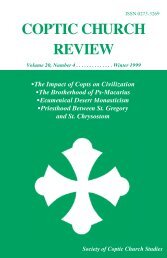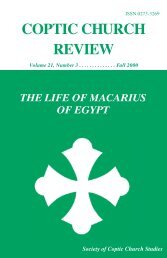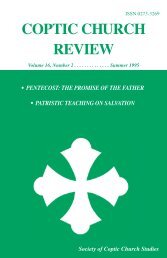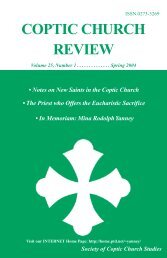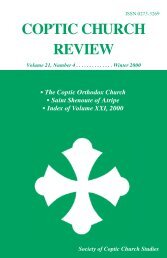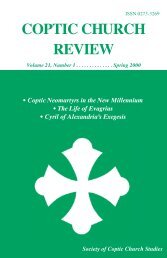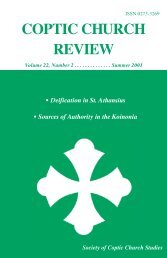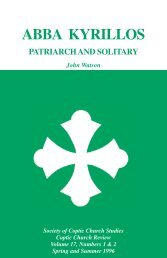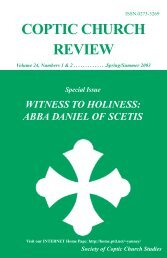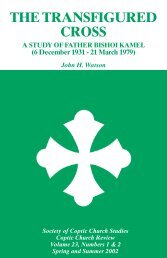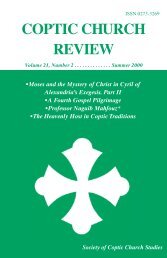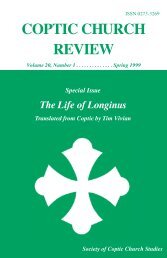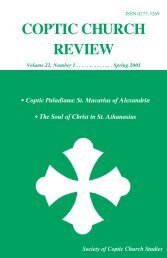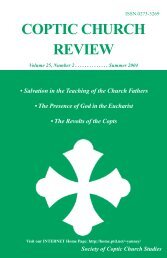the egyptian fate of origenism - Coptic Church Review
the egyptian fate of origenism - Coptic Church Review
the egyptian fate of origenism - Coptic Church Review
You also want an ePaper? Increase the reach of your titles
YUMPU automatically turns print PDFs into web optimized ePapers that Google loves.
4 SPRING 1995 • COPTIC CHURCH REVIEW<br />
VOLUME 16, NUIMBER 1<br />
In <strong>the</strong> past two or three years my attention was directed again and again to<br />
considering more closely <strong>the</strong> relationship between Antony and Athanasius. If I am<br />
correct one might discover in that relationship <strong>the</strong> decisive clue for catching on one<br />
side what I would like to call <strong>the</strong> properly Athanasian inspiration in Athanasius’<br />
essay On <strong>the</strong> Incarnation, and on <strong>the</strong> o<strong>the</strong>r side Antony’s genuine contribution to<br />
<strong>the</strong> intellectual tradition <strong>of</strong> Christian Alexandria.<br />
My study focuses on Antony’s seven au<strong>the</strong>ntic letters, before shifting over to<br />
Athanasius’ treatises On <strong>the</strong> Incarnation <strong>of</strong> <strong>the</strong> Word and Against <strong>the</strong> Arians. My<br />
conclusion shall consist in a citation <strong>of</strong> Evagrius Ponticus, with a short comment<br />
on <strong>the</strong> properly Egyptian <strong>fate</strong> <strong>of</strong> Origenism.<br />
I. ANTONY’S LETTERS: THE FIRST ORIGENISM IN THE<br />
DESERT<br />
The original language <strong>of</strong> Antony’s letters was <strong>Coptic</strong>. The au<strong>the</strong>nticity <strong>of</strong> <strong>the</strong><br />
seven letters has been confirmed by recent scholarship. A Greek translation <strong>of</strong> <strong>the</strong>m<br />
circulated before <strong>the</strong> end <strong>of</strong> <strong>the</strong> fourth century. Jerome still read it, but it disappeared<br />
later on from ancient sources. A copy <strong>of</strong> <strong>the</strong> Greek text was still used by<br />
Valerio de Sarasin for a Latin translation in 1475, before vanishing as well. A<br />
Syriac version known <strong>of</strong> only <strong>the</strong> first letter is dated from 534 CE. A Georgian version<br />
<strong>of</strong> all seven letters survived in a monastery <strong>of</strong> Mount Sinai. The original<br />
<strong>Coptic</strong> text seems to be preserved at least for <strong>the</strong> seventh and <strong>the</strong> end <strong>of</strong> <strong>the</strong> sixth<br />
letter, with a few o<strong>the</strong>r small fragments. A collection <strong>of</strong> twenty such letters (<strong>the</strong><br />
au<strong>the</strong>ntic seven ones plus thirteen o<strong>the</strong>rs), translated from <strong>Coptic</strong> into Arabic,<br />
appeared in <strong>the</strong> Monastery <strong>of</strong> St. Antony in <strong>the</strong> eleventh century, and was distributed<br />
in a Latin version from 1641 on. A comprehensive study <strong>of</strong> <strong>the</strong> textual and literary<br />
data concerning <strong>the</strong> letters <strong>of</strong> Antony is now available thanks to <strong>the</strong> Swedish<br />
scholar Samuel Rubenson’s work, The Letters <strong>of</strong> St. Antony. Origenist Theology,<br />
Monstic Tradition and <strong>the</strong> Making <strong>of</strong> a Saint, Lund University Press, 1990.<br />
I also mention here without fur<strong>the</strong>r discussion that <strong>the</strong> letters <strong>of</strong> Antony were<br />
unknown to Athanasius, as he never refers to <strong>the</strong>m in his Life <strong>of</strong> Antony nor in any<br />
<strong>of</strong> his o<strong>the</strong>r writings. Athanasius was even responsible for <strong>the</strong> long-lasting misunderstanding<br />
which prevented many generations <strong>of</strong> scholars from admitting <strong>the</strong><br />
au<strong>the</strong>nticity <strong>of</strong> Antony’s writings, when he declared in <strong>the</strong> Vita that Antony did<br />
“not know <strong>the</strong> letters”. People took it for granted that <strong>the</strong> hermit was properly illiterate,<br />
not realizing that Athanasius applied to his hero <strong>the</strong> topos, popularized by<br />
Origen in Contra Celsum, <strong>of</strong> <strong>the</strong> uneducated fishermen who gained international<br />
fame in preaching <strong>the</strong> gospel as opposed to rhetors or philosophers known only by<br />
a few experts. Athanasius meant that Antony, like himself, did not belong to <strong>the</strong> literate<br />
society <strong>of</strong> academically trained rhetors. Gregory <strong>of</strong> Nazianz, pointing out precisely<br />
that same limitation in Athanasius, did not mean in any way that <strong>the</strong> bishop




